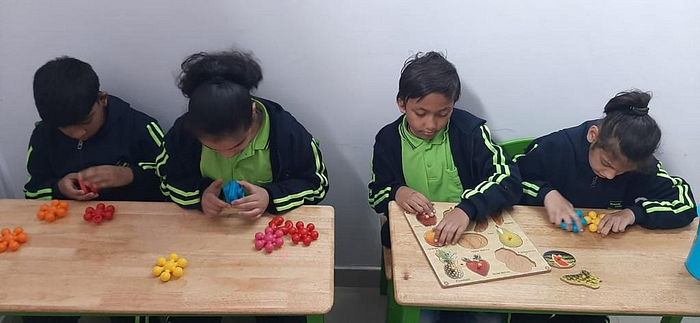By DR SHRUTI SINGH, Early Intervention Consultant & Pharmacologist (AIIMS)
Blog compiled by MS ANVI MAHAJAN
Mark Twain once said, “Work consists of whatever the body is obliged to do. Play consists of whatever the body is not obliged to do.” Playing comes naturally to children, in some form or the other. Play has innumerable benefits which are universal for all children!
Through play, we can connect with our children on the autism spectrum, bond with them and simultaneously achieve targets while helping them gain new skills. Play is powerful and exposes them to different skills. It is one of the best ways to bond with your child!
Ø HOW DOES PLAYING BENEFIT OUR CHILDREN?
- It helps build confidence, self-esteem and self-worth.
- Helps foster a connection and bond with the child.
- Helps develop social and communication skills and language. They learn how to talk to or play with others etc. In addition, skills of waiting, patience, rule-following, imitation and role-playing may also be learnt.
- Teaches the importance of people, relationships and empathy. They learn about sharing, caring, asking for help and functioning in a social environment.
- Develops physical skills like fine and gross motor skills, sensory integration, ADLs (activities of daily life) etc.
- Strengthens motor planning, executive functioning and problem-solving.
- It helps develop foundation skills like eye contact, joint attention etc. It also teaches the concept of actions having results.
- It is a coping and life skill that also prevents them from otherwise engaging in harmful pursuits.
- Encourages imagination and creativity.
Some things to keep in mind:
- Assess your child’s current stage of play.
- Engage, get involved and bond with them without threatening their space.
- Move gradually from unstructured to more structured play to achieve big and small targets in due time.
Ø STAGES OF PLAY
1. Unoccupied play: Child simply moves around and about, discovering movement.
2. Solitary play: Child plays alone without interfering or engaging with others.
3. Onlooker behaviour: Observe others playing but doesn’t play him/herself.
4. Parallel play: Child plays alongside others but not with them. The child can tolerate others in their physical space.
5. Associative play: Child plays while interacting and engaging with others. Little cooperation is required.
6. Cooperative play: Plays with others while interacting and cooperating in a common activity of mutual interest. Generally involves certain rules like those in a board game.
It is essential to evaluate which stage of play your child is at because each stage has its own benefits.
Ø TYPES OF PLAY:
1. Exploratory play: Children play with objects/toys in a manner that may not be the typically intended/ correct way to play with them. They explore playing in their own way, helping them to learn more about shapes, colours, sizes, textures etc. Eg: mouthing a block, messy play, playing with sand.
2. Cause and effect play: Children play with objects where the action leads to an instant result. This is very rewarding for children as it gives instant gratification. Eg: pushing a button and hearing music/sound. It teaches the child that actions have effects and give them a sense of control over actions. This can also be a good opportunity to help your child learn imitation. If your child enjoys throwing around objects, you can take a stick and hit it on a drum and your child may try the same and learn to copy you. You can progress towards teaching them to take turns and ask for help!
3. Toy play: The child plays with a toy in the manner the toy for designed to be played with. It might take a little longer for children on the autism spectrum to learn appropriate toy play but one should try to engage and join into bond and connect. Do not try to force the use of a toy or take away their toys. Accept the level they are at and engage in the same before you move towards teaching the intended use of the toy.
4. Constructive play: Children make or build things and work towards a goal/product. Eg: Jigsaw puzzles, building blocks etc. This helps develop motor skills and problem-solving capabilities.
5. Physical play: Rough and tumble play like running around and playing. This gives an opportunity to explore the environment, interact with others and develop motor skills. Eg: If your child loves jumping, you can introduce the concept of waiting by asking your child to jump at the count of 3.
6. Pretend play: Children use their imagination and pretend to feed stuffed toys, be a teacher, drive a car etc. This develops social, communication and language skills while helping understand how and what others feel.


In every case, we must assess the level and type of play our child engages in. With this knowledge, we can slowly work towards bonding with the child and gaining acceptance in their space. Gradually, we can move to further structure the activities bit by bit.
- Remember the ABC- Assess, Bond, Challenge- Assess your child’s current stage and level of play. Always prioritize developing a connection and bond with your child and once they show that they are comfortable with a particular stage, challenge them gradually and progressively.
- Always reinforce your child’s success and attempts! If your child successfully follows an instruction, wins a race or completes a task while playing, reinforce and praise them immediately. This encourages them to repeat that behaviour which may eventually become habitual.
- Assess their current behaviour, but also expose them to different types of play. If your child doesn’t seem to engage in any constructive play then make some materials available for the same. Do not overwhelm the child with too much, simply provide the requisite objects and let them find their way through it, while progressively guiding them in the right direction.
Children with autism play differently than others. We must keep the following things in mind so that we can identify what issues and challenges our children face and attempt to make things easier.
- Repetitive actions: They engage in the same activities and choose the same toys over and over again.
- Face difficulties in goal-orientated play: Pretend play which has the goal of pretending to drive a car or finishing a jigsaw puzzle to reveal the whole picture may be a difficult activity.
- When left alone, they might feel stuck and may be unable to explore their interests or abilities in the absence of any guidance or structure. Even in a room full of toys or in a park, they sometimes might face difficulties in figuring out what to do.
- They might not play with toys in the intended manner and instead throw them, mouth them or ignore them altogether.
- They prefer to play alone and are reluctant to share games. They may seem unaware of other children (like ignoring other children waiting to take their turn on a slide).
- They may become rigidly rule-bound and are unable to cope with changes like new members in a game or changing teams etc.
- They may become extremely focussed on one or a few elements of the game and ignore the rest. Eg: only playing with car wheels or dice.
More importantly:
– They often find it difficult to connect, bond and foster relationships.
– They may be unable to enjoy playing and derive reinforcement and motivation from it.
– They may be unable to derive happiness from those playing with them.
This is why our primary goal is to interact and bond with the. When they see us taking interest in their likes and dislikes and playing with energy and enjoyment, they begin to make eye contact and respond and connect in their own ways. That is a big win and a milestone in any parent or teacher’s journey!
Also read our blog on
PLAYTIME IS POWERFUL: HOW CAN PLAY HELP AUTISTIC CHILDREN?
And if you are new to the world of Autism, Do read our amazing article on Welcome To Autism-Land
If you have any queries and are looking out for help as a special person or a special Child, do not hesitate to contact us. Please write your queries at contactus@sunriselearning.in
[mc4wp_form id=”4687″]
Do Subscribe to our Mail list Blog to stay updated on our Content.
Thank you for Reading!

